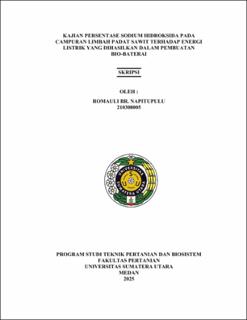Kajian Persentase Sodium Hidroksida pada Campuran Limbah Padat Sawit terhadap Energi Listrik yang Dihasilkan dalam Pembuatan Bio-Baterai
Study of Sodium Hydroxide Percentage in Palm Oil Solid Waste Mixtures on the Electrical Energy Produced in Bio-Battery Manufacturing

Date
2025Author
Napitupulu, Romauli Br
Advisor(s)
Sigalingging, Riswanti
Metadata
Show full item recordAbstract
The abundant palm solid waste as a by-product of the palm oil industry can be converted into alternative energy that is environmentally friendly, its composition contains cellulose, ash, lignin and hemicellulose. This content has great potential to be the main raw material for environmentally friendly and sustainable biobatteries. Sodium hydroxide is used to increase the conductivity of bio-batteries, so that it can affect the performance of bio-batteries. This study aims to obtain the best percentage value of sodium hydroxide in increasing electrical energy in frond waste, empty bunches, and palm kernel shells with variations in the percentage of sodium hydroxide 5%, 10%, 15%. This research was conducted by experimental method using two factorial complete randomized design method. The results showed that the best treatment was found in oil palm empty bunch waste with 15% sodium hydroxide, namely voltage 2.61V, current 69.53 mA, power 181.486 mW, resistance 0.038, and electrical energy 3872.13 mWh.
Collections
- Undergraduate Theses [1108]
